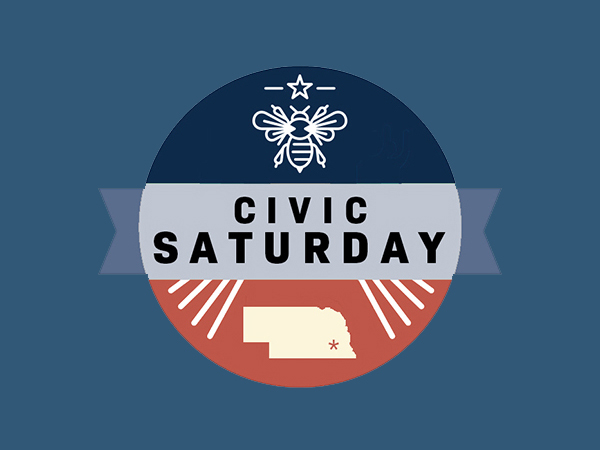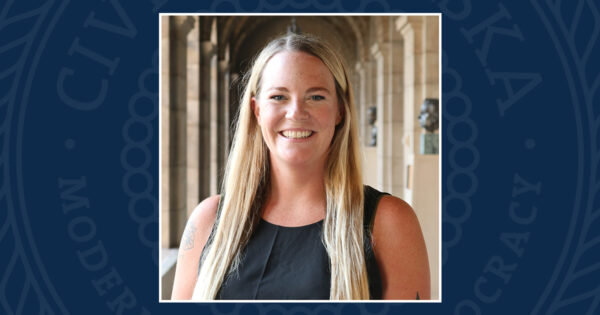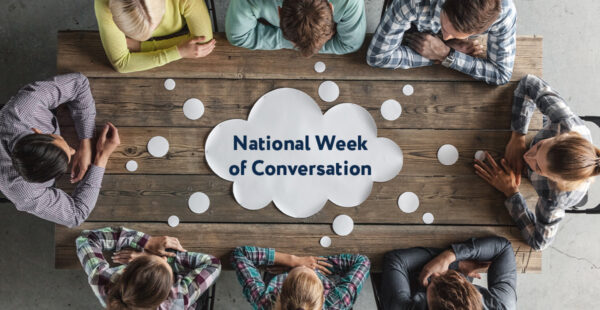On Feb. 18, 2023, Civic Nebraska convened Civic Saturday at the Nebraska History Museum in Lincoln. The gathering was in conjunction with the new Smithsonian-affiliated exhibit, “American Democracy: A Great Leap of Faith.” Steve Smith, a national Civic Saturday Fellow, delivered the following “civic sermon” to nearly 70 attendees gathered at the museum as well as those watching remotely at History Nebraska sites in McCook and Scottsbluff. To listen to audio of the full gathering, click here.

To start us off, I’d love to see a show of hands. In the past few years, how many of us have participated in a rally or a march? Doesn’t matter what for, I’m just looking for some basic info.
(Dozens of hands go up)
OK, definitely a few of us. OK, next question: There’s a popular call-and-response chant that tends to occur at marches and rallies. I’ll call, you respond.
Ready?
Show me what democracy looks like!
(The attendees respond: This is what democracy looks like!)
Yeah, that’s it! Right on! That’s one of my favorites.
Now that we’ve gotten warmed up, let’s get on with the show. I just want to say how grateful I am to be here today, in this space, and how thankful I am for the partnership with History Nebraska to make this gathering happen. Civic Saturday fits the Museum’s new exhibition like a glove.
And speaking of the new exhibition, I had an opportunity to experience it recently, and it truly is amazing. Taking it all in … literally walking through the story of our American democracy, its triumphs and advances as well as its struggles and setbacks – well, you can’t help but feel deep, deep gratitude to the men and women who took the plunge some 250 years ago, and started all of this.
 Those Americans were the first to ask – to seriously ask – what happens when a people decide to govern themselves? It’s difficult for us, I think, to fully appreciate just how radical of a notion that was at the time. I mean, radical to the point of unthinkable. Those folks may as well have asked: What happens when a people decide to live on Mars?
Those Americans were the first to ask – to seriously ask – what happens when a people decide to govern themselves? It’s difficult for us, I think, to fully appreciate just how radical of a notion that was at the time. I mean, radical to the point of unthinkable. Those folks may as well have asked: What happens when a people decide to live on Mars?
Remember, our American experiment was born in the age of monarchy. A democratic way of life only existed in fragments in the deep past. It was mostly in the imaginations of political theorists and philosophers. Proposing we do things without the approval of a king or queen was grounds for treason.
So yeah, when those newly independent Americans said “This is what democracy looks like,” that took audacity. Guts. Or, more accurately, the concept we’re focusing on today: faith.
In so many ways, that’s the story of America — an enduring confidence in something you can’t see, but you know in your heart of hearts that it exists. A way of life that respects the essential worth of every person, while also being devoted to the common good. Expectations, not only for ourselves but for one another that are at their core optimistic and hopeful. The Founders put their trust in these abstract principles and willed them into existence. For themselves and their posterity.
So here we are, the posterity. And this is a good day to celebrate and explore our democratic faith.
First, let’s look at the foundations of our faith – where did it come from, and why?
Then, let’s ponder the ongoing, centuries-long miracle of sustaining that faith.
And finally, we’ll finish with a few thoughts about the importance of spreading the faith right now.
Founding our faith.
Every country has a narrative about how it came to be – a self-definition that highlights its unique character and its role in the world, a story that affirms and amplifies its national values. To build these myths, nations often rely upon their shared ethnicity, culture, or language.
The United States couldn’t do that. We had no shared ethnicity. We had no shared language. And we had no shared culture, not really. No, America came to be because of an argument, during a Revolutionary summer, driven by a radical proclamation that was mostly a list of royal grievances – but ended up becoming something much more.
 Why did this happen? Our Founders were many things – inventors, lawyers, farmers, military men – but first and foremost, they were thinkers. More specifically, they were Enlightenment thinkers. And one of their biggest credos was the Enlightenment maxim that the pursuit of material wealth was virtuous only if it also promoted the public good. Ben Franklin called this “enlightened self-interest.”
Why did this happen? Our Founders were many things – inventors, lawyers, farmers, military men – but first and foremost, they were thinkers. More specifically, they were Enlightenment thinkers. And one of their biggest credos was the Enlightenment maxim that the pursuit of material wealth was virtuous only if it also promoted the public good. Ben Franklin called this “enlightened self-interest.”
He and his fellow Revolutionaries, guys like John Adams and Thomas Jefferson, these guys were the movers and shakers who realized they were in a moment of world history like no other. They pushed the continental Congress to break away at long last from a tone-deaf monarch. In his place would be a new modern era of skepticism, reason, and universal liberty.
Right?
Well … sure, Jefferson was channeling Enlightenment philosophers like John Locke when he wrote “All men are created equal.” But at the time, he probably wasn’t referring to individual equality – and certainly not for everyone.
How could he? He was a product of his time: a slaveowner and one of Virginia’s landed gentry. Today, we’d sneer and call him a “Coastal Elite.” When he wrote those words – “All men are created equal” – his likely intent was to say that colonial Americans as a whole had the God-given right to set up their own governments, just like any other sovereign nation.
Whether those governments recognized all individuals as equal? That was another kettle of fish, wasn’t it?
But here’s the thing. It really didn’t matter. As word of the document made its way up and down the continent, people for the first time began to seriously consider what an actual, functional democracy might look like. Above all, they zeroed in on the Declaration’s moral underpinnings: universal equality, liberty, and justice. For the first time, they imagined equality for enslaved peoples, poor laborers, women, and anyone else who was seen as a second-class citizen in early America.
How could they not?
As Americans came to see the Declaration in a spiritual light, it took its place as a hallowed scripture of a new civil religion in America. Then, by codifying our founding creed, the Constitution joined it.
With each new generation, we’ve passed down the inherent rights in those scriptures, as well as the responsibilities to live up to their ideals. Because, of course, we know the work of the Founders is unfinished – that a more perfect Union is never fully formed. It becomes the job of each new generation to proclaim – yeah, this is what democracy looks like.
It’s the job of each new generation to keep the faith.
That’s the second thing I want to talk about. It takes an advanced level of responsibility and awareness to keep our American experiment working. Most of all, powerful citizenship means we must be present – not just physically, but emotionally, intellectually, and spiritually – in all of the matters that truly matter.
In the course of human events, we’ve gone from an agrarian, coastal republic made up mostly of former Britons to a complex, technocratic, multiethnic democracy that spans a half-dozen time zones. Needless to say, we’ve grown a bit. We’ve changed.
 What hasn’t changed? Through it all, we have argued. And that, friends, is why our faith in our Republic has been so durable. As I said earlier, the United States came into being because of an argument. By necessity, this argument persists. Arguing — not fighting — amongst ourselves is a feature of our system, not a bug.
What hasn’t changed? Through it all, we have argued. And that, friends, is why our faith in our Republic has been so durable. As I said earlier, the United States came into being because of an argument. By necessity, this argument persists. Arguing — not fighting — amongst ourselves is a feature of our system, not a bug.
I know. It doesn’t feel very Nebraska Nice. But the truth is, we’ve faced deep partisan divisions since the very beginning. Necessary divisions. The Patriots and the Loyalists. The Federalists and Anti-Federalists. The North and South. Democrats and Republicans.
American democracy isn’t built on group hugs and singing kumbaya. We mix it up. We argue. And we mutually pledge to keep the argument going forever. Why? Because little by little, slowly but surely, those arguments move us toward a more perfect union.
This museum’s new exhibition chronicles the tangible results of those authentically American arguments. It charts our national conversation, as more and more Americans have summoned the audacity, the guts, and, yes, the faith to call the Declaration’s bluff. To fully claim their rights as full equal inheritors of the American Promise. And to help us all to say, “No, actually, this is what democracy looks like.”
This process is not made possible by economic or technological or military domination. This belief lives here (holds hand on heart). Each of us feels it. Democracy is precious, and that it’s exceptional, and that it’s worth fighting for.
Now, I can see it on some of your faces: Do we really believe that? Really?
I get it.
Today, we are overwhelmed with noise, making it hard to tell what’s real and what isn’t. We’re trapped on social media, which thrive on conflict, amplify division, and peddle disinformation. Our legacy media enrich themselves by framing everything in black and white – or, more accurately, Red and Blue. Politicians rise to prominence not because they have sound ideas, but because they’re the loudest ones in the room. They’re good at two things: Telling us how terrible everything is, and telling us who we should blame.
Makes it kinda hard to keep the faith, doesn’t it?
I imagine that’s why many of us find it easier to just wave the flag and convince ourselves that greatness has been achieved, and the work of building our nation is done, and now whatever happens, happens.
I get it. I do. The more we come to grips with what is happening in our world, the more frustrated we can become, because we feel unable to truly affect any of it. It’s all too big, too vast, too immovable, too complex. So we become something closer to spectators in our own country. It’s easier to check out; to keep it all at arm’s length, be distracted by Netflix and PlayStation and the Super Bowl, or whatever the spectacle of the moment might be.
It’s often said that the price of freedom is eternal vigilance. But what I’ve just described is far from vigilance. It’s the pursuit of comfort, the avoidance of responsibility. Citizenship built on those two principles is not one that will last. It’s not one designed to keep the faith.
But we have to keep it.
Not only that, but we must spread it.
Here’s the thing about the current despair over American democracy: If it persists too long and too loudly, it risks becoming a self-fulfilling prophecy. Taking part in the democracy-is-doomed refrains can, in fact, doom democracy.
I don’t suggest ignoring this popular sentiment. And I’m not naive to the challenges we face. But I’d suggest we all remember that despite it all, our American system remains awfully extraordinary.
Why? Because it comes from us. Our democratic roots run deep. Our devotion to equality is unwavering, even if our track record is uneven. Our laws, institutions, and traditions are derived from the collective empathy and hope and optimism of our people.
This makes our democracy incredibly dynamic and resilient. It’s unlike any other system in the world. It doesn’t disintegrate with the election of a populist demagogue. It’s tough. Because it comes from here (holds hand to heart).
Eric Liu, the father of Civic Saturdays, often says democracy works only if enough people believe democracy works. Of course, he’s right; while most current polling suggests we’re pretty sour about the way things are going right now, we do share an underlying belief that we all will get through this together – and what’s more, we’ll be better off when we reach the other side.
You can’t manufacture this mindset. We’re believers. And it’s this belief that moves us forward, even today, with confidence in our ideals and our ideas. In America, exchanging ideas is not just some detached, academic exercise. Speaking up and advocating for change can be as empowering as they are powerful: When we use our voices, whether it’s speaking truth to power or to one another, we walk in the footsteps of those patriots throughout our history who cast away the established order, the status quo, of their time.
This American character is so important right now. This is unmistakably a threshold chapter in our national story. It certainly bears all the hallmarks, at least – an unsettled citizenry, political and social turbulence, and new technologies disrupting just about everything.
If we stay true to form, this turbulent period will eventually give rise to a new era of change and progress that is more efficient, equitable, and durable than what came before it. This has happened before, and God willing, it’ll happen again.
So what can we do as Lincolnites, Omahans, Nebraskans? We have to continue to argue like Americans, and then act on those arguments. Yes, it’s slow going, and yes, it’s prone to misfires and false starts. But this is good-faith work – word by word, sentence by sentence, relationship by relationship, it sustains and expands American democracy.
The cynics often dismiss this as naive and overly idealistic. Yet, our history tells us otherwise. It tells us not to listen to such naysaying.
Our history says that word by word, sentence by sentence, relationship by relationship and movement by movement, more and more of us have gone from unheard to heard, from misunderstood to understood, and from unequal to equal.
 So, I’ll tell you what I believe democracy looks like.
So, I’ll tell you what I believe democracy looks like.
It looks like you. And you. And you. And all of us gathered today, listening and sharing and learning from one another on this bright Midwestern Saturday.
This all started with a great leap of faith. And with each passing generation, we’ve nurtured and tended and grown in that faith. Right up to today. Our democracy works. Because enough of us believe that it can work.
Let’s share that belief with others, in good faith. And let’s start right now.
Let’s give that chant one more try, shall we?
Ready?
Show me what democracy looks like!
(The attendees respond: This is what democracy looks like!)
Show me what democracy looks like!
(The attendees respond: This is what democracy looks like!)
Show me what democracy looks like!
(The attendees respond: This is what democracy looks like!)
Thank you.





